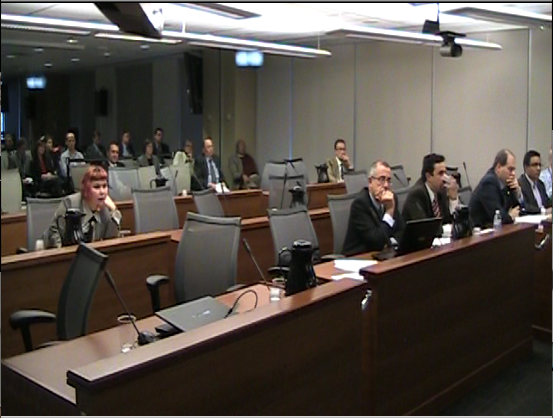The Ontario Liberal Government has committed up to $35 billion to expand the aging fleet of nuclear reactors at the Darlington Nuclear Station. The government argues that nuclear energy is the responsible choice to serve our current and future energy needs. Nuclear energy itself emits no carbon and has thus been championed by the government and the industry’s lobbying campaigns as “green” and a “clean” way to avert global warming.
A loose-knit group of Trent students and Peterborough residents is attempting to intervene in the expansion plan by making oral presentations to a Joint Review Panel, which has been charged with conducting a public consultation.
Matthew Davidson of OPIRG Peterborough is assembling archival information on how Peterborough and Ontario environmentalists have, in the past, contested this expansion and the initial building of four reactors that sit on the shore of Lake Ontario. The station is situated 69 kilometres southwest of Peterborough, and 66 kilometres east of Toronto.
Drawing on over 30 years of accumulated research and local nuclear contestation, Davidson claims “Peterborough folk have resisted nuclear energy over decades and there has been a serious and longstanding commitment to oppose the industry.” In Davidson’s words, the point of their upcoming intervention will be to communicate “we don’t want it now and we never wanted it.”
Former Peterborough resident Paul McKay’s new and strategically released book, Atomic Accomplice: How Canada Deals in Deadly Deceit, documents how federal and provincial governments have secretly and not so secretly manipulated the energy marketplace by price-fixing, subsidies and cost-overruns.
If the cost of rebuilding the aged reactors at the Darlington Nuclear Station is factored in, the Ontario Clean Air Alliance has suggested the actual cost of the energy will be from 19 to 37 cents per kilowatt-hour. They have aggressively mounted a “Stop a $35 Billion Nuclear Handout” campaign, claiming “every nuclear project in Ontario’s history has gone massively over budget.” In what may amount to a massive transfer of wealth from tax payers to the industries and corporations that use the energy at a greater rate, taxpayers will be on the hook to potentially cover 2.5 times Ontario Power Generation’s (OPG) estimates, not including the $1.8 billion per year on the taxpayers in debt retirement charges for previous cost overruns.
According to Roy Brady of Safe And Green Energy (SAGE), the Darlington Newbuild Environmental Impact Statement has ignored the language in Section 7 of the Green Energy Act. SAGE has asked the Canadian Environmental Law Association to construct an “irrefutable legal argument around the viability of energy alternatives to replace the Darlington project.”
The Ontario Power Authority’s 2006 minimum targets for renewable energy over 20 years suggests that nuclear and renewable energy are direct competitors for ‘space’ on the grid according to an extensive and compelling report, “Renewable is Doable.” The report, prepared by the PEMBINA Institute and Greenpeace, has crunched the numbers. It includes evidence supporting the claim that “building a new nuclear plant will cost ratepayers anywhere from 12 to 48 per cent more than delivering that same amount of power using a mix of renewable and more efficient options.” The report also projects that beyond a temporary increase in jobs to build the reactors, that a green energy portfolio would create an additional 27,000 new and sustained jobs in Ontario.
A review of materials from different environmental intervener organizations suggests they have jettisoned low dose radiation exposure arguments based on peer reviewed science to focus on the legal and procedural apparatus. For example, several groups plan to challenge an outdated 1974 act of parliament, the Nuclear Liability Act. The act indemnifies nuclear vendors, suppliers and operators from paying for the full clean up costs and compensation in the event of an accident or terrorist incident.
Paolo Greco, one of a group of interveners from the Trent community has noted that OPG has not “accounted for the costs of managing the increased toxicity of nuclear wastes produced by the next generation of reactors.” The Joint Panel Review’s jurisdiction does not consider nuclear waste; this task goes to the Nuclear Waste Management Organization, whose advisory board is critical of expansion. In a statement, the organization claimed that “the potential role of nuclear energy in addressing Canada’s future electricity requirements needs to be placed within a much larger policy framework that examines the costs, benefits and hazards of all available forms of electrical energy supply, and that framework needs to make provision for comprehensive, informed public participation.”
The Joint Review Panel will be hearing the public interventions and oral presentations starting March 21 in Courtice, Ontario. One intervener, Trent Student Amanda Lickers, has stated publicly to the Canadian Nuclear Safety Commission, “I’m not a big fan of the nuclear industry on the whole. I feel that having an environmental assessment passed on a substance like uranium where the waste management and waste disposal aspects are still being worked out is a little problematic.”
Reprinted with permission from Arthur, the Peterborough and Trent independent press.



